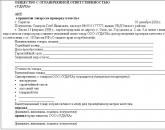How to write explanatory notes correctly. Example of an explanatory note for being late for work
Everyone sometimes has "punctures" at work - being late, voluntary or involuntary violations of discipline, etc. What should be expected from the employer in these cases?
Article 193 of the Labor Code states that the application of a disciplinary sanction by the employer to the employee in case of violation must be preceded by a written explanation of the latter. That is, it is necessary to take an explanatory note from him. What it is? How to write explanatory notes? Faced with this for the first time, they often get lost and start to panic. Meanwhile, everything is not so scary.
An explanatory note is a document containing the official version of what happened on behalf of a "fined" employee with his signature and date. The refusal of a subordinate to provide the required explanation is not a reason for imposing a penalty. But in this case (if the explanatory document is not available within two working days), an appropriate act must be drawn up.
Who can claim it?
Hence the conclusion - it is the employer who has the right to demand an explanatory note, and not everything in a row (for example, a representative of inspection bodies does not have such a right). And the other - it is still better to write an explanatory note in order to clarify the situation as much as possible and document the existing valid reasons for the violation.
In case of further disagreement with superiors, an explanatory note is an officially adopted document that can work in your favor. The absence of it gives the authorities the right to interpret your actions at their own discretion.
Do not lie!
There are unspoken rules about how to write explanatory notes that you must follow in order to avoid even more trouble. First of all, never write an explanatory lie. The likelihood of being found unreliable is very high, and you will ruin your reputation even more with a lie.
Do not try to shift the blame to colleagues, as in this case, explanatory notes will also be required from them. Everyone will provide their own version, and it is not yet known what details may come up in this case. And you will definitely make enemies.

"I did not know..."
Do not write that something has not been explained to you and something has not been taught. There is a job description, you signed it when applying for a job. Normally, all your duties, areas of responsibility and most force majeure situations should be clearly spelled out in it. It is better, before writing explanatory notes, to go through its provisions again in order to know exactly what you do not need to write.
If you persist in your own ignorance, the employer will require an explanatory note from your immediate supervisor, who, at your appointment, was obliged to tell and show everything. And this is no better than explanations from colleagues.
Instruction is our everything
How to write explanatory notes according to all the rules? To give weight to the document, it is better to draw it up, referring to the points of the job description. Obvious misses can be presented as a misinterpretation. And if you really want to blame someone, without undue emotion, refer to misunderstandings based on different interpretations of these very points. Or, at the very least, a prejudiced attitude.
A little trick: to minimize the feeling of your own guilt and give the situation a businesslike character, title the document not "Explanatory" but "Explanatory Note".
If your violation is too obvious, and there is no point in getting out, the best way out is to refer to illness, poor health, overload at work. In this case, at the end, be sure to indicate that you acknowledge the mistake and undertake to prevent this from happening in the future.

Form of writing
How to write a good explanation? All explanatory notes are written according to a certain template, which includes, first of all, an indication of the organization, position and full name of the person to whom it is addressed. Then - from whom exactly (also indicating the position) and the name "Explanatory (or explanatory) note".
The text, as a rule, begins with the words "Regarding ..." or "Regarding ...", followed by a direct description of the situation. It should be informative, but without irrelevant details, and written strictly to the point.
At the end of the explanatory note, the name of the compiler is indicated, his signature and the current date are put.
When it's required
In what cases is an explanatory letter written at work? A list of possible situations is given in the Labor Code. Let's look at them in more detail.
Most often, explanatory letters are written in cases of violation of labor discipline. These include: being late, being absent for 4 hours or more from the workplace, appearing drunk at work. By the way, in the latter case, you can be fired immediately.

Check the inspector
Another, no less frequent option is checks and revisions. Based on their results, an act is drawn up listing all identified violations and inconsistencies. Such an act must contain a link to the paragraph of the instruction that you violated.
It happens that inspectors copy the form of the act from previous inspections (violations are usually of the same type), without bothering to check the relevance of laws and instructions. In this case, references to already repealed provisions are possible.
How to write an explanation in this case? In your own interest, you should compare the violations imputed to you with the items in the job description. In some cases, it may turn out that there was no violation as such. Please indicate this on your supporting document. If the acts are not drawn up in the form or contain references to regulations, it will be difficult, if not impossible, to prove a violation.
Oh those colleagues...
There is also an option when a memo was "dashed" on you from a neighboring department or structural unit. There can be many reasons for this. How to react? If claims are made by higher authorities, it is better to report in detail in order to avoid misunderstandings.
When colleagues of the same level as you are sneaking around, it will not be superfluous to find out the background of what is happening and present your own version to the authorities. How to write an explanation in this situation? The question is not easy, much depends on the existing relations and the atmosphere in the team.
What should be written in cases where an explanation is inevitable?

If you are late
So, consider being late for work (a widespread option). Strictly speaking, there is no concept of "lateness" in the current Labor Code. The law operates with the term "working time" and refers to "absence from the workplace without good reason." That is, the employer has the right to apply sanctions if you were not at work at any time during the working day.
What exactly are the sanctions? If, due to your absence, production has not been stopped and no losses have occurred, the maximum penalty is a reprimand or a remark. But the concept of “lateness” is usually governed by the organization’s own (internal) regulations that you signed when you hired.
Don't get lost
It is quite difficult to give an example of an explanatory note about being late for work - each case is individual. But the general principles of its writing, of course, exist. This paper, like others, is written in the name of the head and carries an explanation of the situation and the reasons for the delay. Be sure to indicate the date of compilation and, of course, a personal signature.
If you plan to further challenge the threatening consequences of being late, take care to write this document in duplicate. The first will go to the office, the second with the secretary's mark of acceptance remains with you.
A good example of an explanatory note about being late for work is when, after indicating the reasons for the violation, one clarifies one's attitude to the situation, for example, "based on all of the above, I consider the reason for being late to be valid."
If there are any documents to justify your absence from work (certificate of visiting the clinic, subpoena, etc.), they must be attached to the explanatory note.

You are a truant
In the case of absenteeism, which the Labor Code considers absence for 4 hours or more at one's workplace, the reason is most often disrespectful. An exception may be a force majeure situation - for example, the courier of the organization, while performing duties, was detained by police officers and taken to the department for identification. Moreover, he did not have the opportunity to contact his superiors and clarify the situation. In justification, you must provide a copy of the protocol.
If an employee is "lost" at work for a long time (the situation is possible, for example, in a large enterprise with many shops and a large number of staff), then the reasons for this can be very different. For example, acute toothache and an urgent trip to the dentist. It happens that a person does not have time or does not have the opportunity to warn about the need to urgently leave work. Then you need to stock up on a certificate from the clinic indicating the date and time of your appointment.
If you have a domestic injury
Not every explanatory is connected with fault. Sometimes it is necessary under circumstances beyond your control. For example, in the event of a domestic injury. If you managed to get injured, which is recorded by the sick leave, at work you will have to describe in detail the circumstances of the incident in writing. This is required to pay for your sick leave.
In this case, the victims are provided with an explanatory note for the injury to the organization's social insurance commission. A sample of it can be taken from the chairman of the said commission. The note must contain a description of the accident, indicating the medical institution that issued the certificate of incapacity for work and the validity of the latter.

Explanatory letter to school
In addition to explanatory notes at work, all parents from time to time have to draw up a similar document for the school where the child is studying. As a rule, one thing is required - to state the reasons for the absence of classes by students. The form of such an explanatory can be arbitrary, but it is still better to adhere to a certain structure.
How to write an explanatory letter to school?
The heading of the document must contain the number and name of the educational institution and the surname of the person whose name it is written in (usually the director) in the dative case. The title "Explanatory Note" is given without quotation marks.
In the text, after indicating the fact of missing classes (with the exact date), the actual reasons for this fact are given. Most often this is an illness or feeling unwell, participation in a competition, or family circumstances (for example, a trip somewhere).
The explanatory note must be dated and signed.
Popular
- How to get a TIN: possible ways
- What kind of business can you do?
- Written notice of termination of the lease
- Business from scratch. Things to do?
- Cost of goods sold: formula, methodology and calculation example
- How to write a vacation application - examples
- What kind of business can be opened in a small town or village?
- The formula for calculating the cost of services, products sold and total cost
- Sample memorandum: I bring to your attention
- Example of an explanatory note for being late for work




